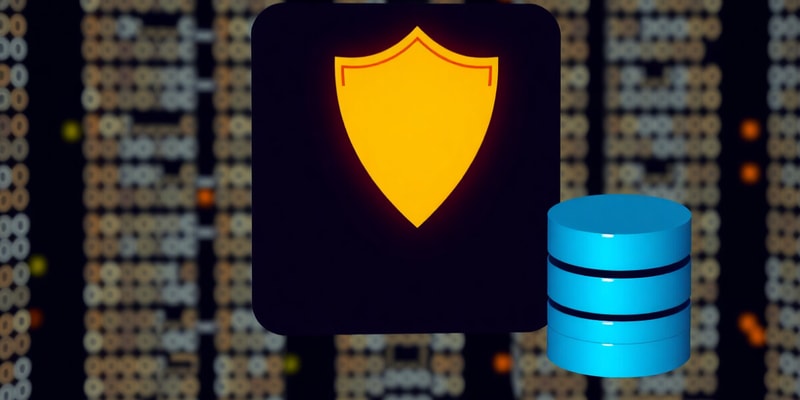Podcast
Questions and Answers
What method was used to ensure the protection of sensitive data in the payments system?
What method was used to ensure the protection of sensitive data in the payments system?
Which regulatory compliance standard was specifically mentioned for payment systems?
Which regulatory compliance standard was specifically mentioned for payment systems?
What was the purpose of integrating security monitoring tools in performance optimization processes?
What was the purpose of integrating security monitoring tools in performance optimization processes?
How were access controls implemented in the system?
How were access controls implemented in the system?
Signup and view all the answers
What type of testing was incorporated into the CI/CD pipelines to evaluate security posture?
What type of testing was incorporated into the CI/CD pipelines to evaluate security posture?
Signup and view all the answers
What was a key outcome of integrating security considerations during performance optimization?
What was a key outcome of integrating security considerations during performance optimization?
Signup and view all the answers
What was the focus of the training sessions provided to the engineering team?
What was the focus of the training sessions provided to the engineering team?
Signup and view all the answers
What was the purpose of conducting penetration testing?
What was the purpose of conducting penetration testing?
Signup and view all the answers
What ensures that only authorized entities can access or modify critical data in secure APIs?
What ensures that only authorized entities can access or modify critical data in secure APIs?
Signup and view all the answers
What was maintained to ensure that everyone understood the performance optimization strategies?
What was maintained to ensure that everyone understood the performance optimization strategies?
Signup and view all the answers
What was the primary objective of migrating retail microservices from SQL Server to PostgreSQL?
What was the primary objective of migrating retail microservices from SQL Server to PostgreSQL?
Signup and view all the answers
Which strategy was utilized in the PostgreSQL migration to minimize risk?
Which strategy was utilized in the PostgreSQL migration to minimize risk?
Signup and view all the answers
What is a key benefit of adopting a microservices architecture for the payments system?
What is a key benefit of adopting a microservices architecture for the payments system?
Signup and view all the answers
How did the adoption of Apache Kafka for CRO Adapters improve data flow reliability?
How did the adoption of Apache Kafka for CRO Adapters improve data flow reliability?
Signup and view all the answers
How did refactoring algorithms contribute to the efficiency of the payment system?
How did refactoring algorithms contribute to the efficiency of the payment system?
Signup and view all the answers
What was a major challenge faced when developing REI’s payment processing system?
What was a major challenge faced when developing REI’s payment processing system?
Signup and view all the answers
What role did Redis caching play in optimizing database performance?
What role did Redis caching play in optimizing database performance?
Signup and view all the answers
What approach significantly reduced code duplication in the payment processing system?
What approach significantly reduced code duplication in the payment processing system?
Signup and view all the answers
What does connection pooling in database optimization aim to reduce?
What does connection pooling in database optimization aim to reduce?
Signup and view all the answers
What is the purpose of implementing load balancers in the system?
What is the purpose of implementing load balancers in the system?
Signup and view all the answers
What technology was utilized for real-time threat detection against DDoS attacks?
What technology was utilized for real-time threat detection against DDoS attacks?
Signup and view all the answers
What was a key outcome of implementing Redis caching in the payment processing system?
What was a key outcome of implementing Redis caching in the payment processing system?
Signup and view all the answers
How did auto-scaling policies contribute to system performance?
How did auto-scaling policies contribute to system performance?
Signup and view all the answers
Which technique was used to prevent a single service instance from becoming a bottleneck?
Which technique was used to prevent a single service instance from becoming a bottleneck?
Signup and view all the answers
What role did Splunk play in system monitoring?
What role did Splunk play in system monitoring?
Signup and view all the answers
What was the purpose of implementing CI/CD pipelines in optimizing the payments system?
What was the purpose of implementing CI/CD pipelines in optimizing the payments system?
Signup and view all the answers
What was a significant benefit of developing a reusable CRO Adapter in the Kafka adoption process?
What was a significant benefit of developing a reusable CRO Adapter in the Kafka adoption process?
Signup and view all the answers
How did asynchronous processing improve the transaction handling capabilities?
How did asynchronous processing improve the transaction handling capabilities?
Signup and view all the answers
Why was it critical to establish rollback procedures during the PostgreSQL migration?
Why was it critical to establish rollback procedures during the PostgreSQL migration?
Signup and view all the answers
Which of the following was a benefit of using Google Cloud Monitoring?
Which of the following was a benefit of using Google Cloud Monitoring?
Signup and view all the answers
What advantage does fault isolation provide in a microservice architecture?
What advantage does fault isolation provide in a microservice architecture?
Signup and view all the answers
What approach helped improve transaction processing speed in the payment system?
What approach helped improve transaction processing speed in the payment system?
Signup and view all the answers
What strategy was used to ensure zero-downtime deployments?
What strategy was used to ensure zero-downtime deployments?
Signup and view all the answers
Why was it important to implement CI/CD pipelines?
Why was it important to implement CI/CD pipelines?
Signup and view all the answers
Which of the following describes the outcome of optimized transactions in the payments system?
Which of the following describes the outcome of optimized transactions in the payments system?
Signup and view all the answers
What was the main purpose of the Google Cloud Monitoring dashboard developed for DDoS threat management?
What was the main purpose of the Google Cloud Monitoring dashboard developed for DDoS threat management?
Signup and view all the answers
How did implementing CI/CD pipelines impact the payment processing system?
How did implementing CI/CD pipelines impact the payment processing system?
Signup and view all the answers
What technique was employed to ensure secure transactions in the payment system?
What technique was employed to ensure secure transactions in the payment system?
Signup and view all the answers
What tools were utilized for managing infrastructure configurations?
What tools were utilized for managing infrastructure configurations?
Signup and view all the answers
What was a challenge faced during the integration of Apache Kafka?
What was a challenge faced during the integration of Apache Kafka?
Signup and view all the answers
Which method improved resilience and reduced the risk of unauthorized access in the payment system?
Which method improved resilience and reduced the risk of unauthorized access in the payment system?
Signup and view all the answers
What was the outcome of using monitoring tools for incident response?
What was the outcome of using monitoring tools for incident response?
Signup and view all the answers
What was the purpose of automated testing in the performance optimization process?
What was the purpose of automated testing in the performance optimization process?
Signup and view all the answers
Which action contributed to a reduction in duplicate transactions after implementing Kafka?
Which action contributed to a reduction in duplicate transactions after implementing Kafka?
Signup and view all the answers
How did historical data analysis contribute to system performance?
How did historical data analysis contribute to system performance?
Signup and view all the answers
What is one benefit of integrating Splunk alerts with Slack?
What is one benefit of integrating Splunk alerts with Slack?
Signup and view all the answers
What was a key focus in optimizing code performance for the payments system?
What was a key focus in optimizing code performance for the payments system?
Signup and view all the answers
Why is containerization important for microservices?
Why is containerization important for microservices?
Signup and view all the answers
What impact did effective load balancing have on the payment processing system?
What impact did effective load balancing have on the payment processing system?
Signup and view all the answers
What method was used to maintain high availability during peak periods?
What method was used to maintain high availability during peak periods?
Signup and view all the answers
What is a key advantage of using Infrastructure as Code (IaC)?
What is a key advantage of using Infrastructure as Code (IaC)?
Signup and view all the answers
What type of testing was emphasized for early identification of issues?
What type of testing was emphasized for early identification of issues?
Signup and view all the answers
What caching strategy was implemented to ensure frequently accessed data remained in the Redis cache?
What caching strategy was implemented to ensure frequently accessed data remained in the Redis cache?
Signup and view all the answers
How was automated cache invalidation achieved after data updates?
How was automated cache invalidation achieved after data updates?
Signup and view all the answers
What tool was used for monitoring the Redis cache performance?
What tool was used for monitoring the Redis cache performance?
Signup and view all the answers
What technique was used to perform the PostgreSQL migration effectively?
What technique was used to perform the PostgreSQL migration effectively?
Signup and view all the answers
Which aspect of the migration process helped ensure data integrity?
Which aspect of the migration process helped ensure data integrity?
Signup and view all the answers
What was the outcome of the PostgreSQL migration in terms of service continuity?
What was the outcome of the PostgreSQL migration in terms of service continuity?
Signup and view all the answers
Which performance optimization was mentioned in regard to the payments system?
Which performance optimization was mentioned in regard to the payments system?
Signup and view all the answers
What verification was done to ensure data consistency during the migration?
What verification was done to ensure data consistency during the migration?
Signup and view all the answers
How were cache retrieval delays identified in the Redis optimization process?
How were cache retrieval delays identified in the Redis optimization process?
Signup and view all the answers
What was a key strategy to prevent production incidents related to caching?
What was a key strategy to prevent production incidents related to caching?
Signup and view all the answers
What feature of the Redis architecture helped minimize stale data issues?
What feature of the Redis architecture helped minimize stale data issues?
Signup and view all the answers
What was the result of implementing the improved caching strategies?
What was the result of implementing the improved caching strategies?
Signup and view all the answers
How did data partitioning contribute to Redis optimization?
How did data partitioning contribute to Redis optimization?
Signup and view all the answers
Which team was engaged for aligning the PostgreSQL migration strategies?
Which team was engaged for aligning the PostgreSQL migration strategies?
Signup and view all the answers
What was the primary outcome achieved by integrating automated monitoring tools into CI/CD pipelines?
What was the primary outcome achieved by integrating automated monitoring tools into CI/CD pipelines?
Signup and view all the answers
Which cloud service was utilized for serverless computing in the scalability projects?
Which cloud service was utilized for serverless computing in the scalability projects?
Signup and view all the answers
How did role-based access control (RBAC) impact the overall system security?
How did role-based access control (RBAC) impact the overall system security?
Signup and view all the answers
What type of database was used to handle unstructured data effectively?
What type of database was used to handle unstructured data effectively?
Signup and view all the answers
Which technology was implemented to ensure consistency across development environments?
Which technology was implemented to ensure consistency across development environments?
Signup and view all the answers
What was one of the benefits of using Akamai CDN in the projects?
What was one of the benefits of using Akamai CDN in the projects?
Signup and view all the answers
In what way did automated security scans contribute to the CI/CD pipeline?
In what way did automated security scans contribute to the CI/CD pipeline?
Signup and view all the answers
What strategy was employed to manage high traffic volumes efficiently?
What strategy was employed to manage high traffic volumes efficiently?
Signup and view all the answers
What was achieved by implementing automated scaling policies?
What was achieved by implementing automated scaling policies?
Signup and view all the answers
Which approach was taken to prevent vulnerabilities like SQL injection during performance optimizations?
Which approach was taken to prevent vulnerabilities like SQL injection during performance optimizations?
Signup and view all the answers
What role did PostgreSQL play in the scalability efforts?
What role did PostgreSQL play in the scalability efforts?
Signup and view all the answers
Which of the following was a direct benefit of the CI/CD system enhancements?
Which of the following was a direct benefit of the CI/CD system enhancements?
Signup and view all the answers
What was one of the reasons for leveraging cloud technologies in the projects?
What was one of the reasons for leveraging cloud technologies in the projects?
Signup and view all the answers
What was the impact of using RBAC in the system?
What was the impact of using RBAC in the system?
Signup and view all the answers
Study Notes
PostgreSQL Migration for Retail Microservices
- Context: Migrated retail microservices from SQL Server to PostgreSQL.
- Objective: Increased scalability and reliability, maintaining 100% data integrity.
- Challenges: Handling large datasets, ensuring zero downtime during migration, and coordinating SRE and engineering teams.
- Approach: Detailed migration scripts, phased rollout, cross-team collaboration (regular sync meetings), and thorough testing with rollback plans.
- Outcomes: Successful migration with zero production incidents, improved performance and scalability, and reduced future migration planning efforts.
Apache Kafka Integration for CRO Adapters
- Context: Implemented Apache Kafka for CRO Adapters to streamline messaging.
- Objective: Improved scalability, reduced redundancy, and enhanced data flow reliability.
- Challenges: High data throughput, standardizing error handling and web services across multiple applications, and team adoption of a new system.
- Approach: Created standardized CRO Adapters, standardized error handling, training sessions, comprehensive documentation, and a phased implementation with parallel processing pipelines.
- Outcomes: Improved data throughput by 30%, reduced duplicate transactions by 50%, and enhanced system resilience.
Payments System at REI
- Context: Developed a payment processing system handling over 10 million transactions annually.
- Objective: Built a robust, scalable, and secure payment system.
- Challenges: High transaction volume, security compliance, and system reliability.
- Approach: Microservices architecture (REST web services, centralized payment logic), performance optimization (code optimization, Redis caching), scalable integration with key systems (CI/CD pipeline), and monitoring/alerting with Splunk and Google Cloud Monitoring.
- Outcomes: Reduced payment processing errors by 30%, maintained high availability, and enhanced security.
Google Cloud Monitoring Dashboard Against DDoS Threats
- Context: Developed a Google Cloud Monitoring dashboard for enhanced security.
- Objective: Real-time DDoS threat detection, scalable monitoring, and cost efficiency.
- Challenges: Real-time threat detection, scalability, and preventing API overage fees.
- Approach: Implemented Google Cloud Monitoring with Slack alerts, optimized data processing, automated response mechanisms, and optimized API usage.
- Outcomes: Improved malicious activity detection by 75%, reduced incident response time, and saved over $10 million in potential API overage fees.
Redis Distributed Caching Optimization
- Identifying Issues: Performance bottlenecks (cache retrieval delays), and inconsistencies between cached and primary data.
- Optimization Strategies: LRU eviction policy, data partitioning, automated invalidation, event-driven updates using Redis Pub/Sub and monitoring.
- Impact: Reduced production incidents by 50%, improved response times (15-20%), and reduced database load.
PostgreSQL Migration Data Integrity
- Priorities: Maintaining data accuracy throughout the migration process.
- Approach: Exhaustive data mapping, phase-wise migration, automated scripts with validation checks, thorough testing, and close collaboration with SRE teams, comprehensive documentation, and rollback procedures.
- Outcomes: Successfully migrated all data with zero downtime and ensured 100% data integrity.
Payments System Performance Optimization
- Techniques: Microservices architecture for independent scaling and fault isolation, optimized algorithms for transaction processing, asynchronous processing, Redis caching, database indexing and connection pooling, load balancing, auto-scaling, CI/CD pipelines, real-time monitoring, and security measures.
- Outcomes: Increased throughput for 10 million transactions, reduced errors by 30%, and improved overall system reliability.
Microservices and High Transaction Volume
- Contribution: Independent scaling, resource optimization, fault isolation with improved resilience, flexible technologies, faster deployments, enhanced maintainability, and load balancing/distribution.
- Outcomes: Efficient handling of high transaction volumes and enhanced system reliability.
Monitoring Tools for Performance and Reliability
- Tools: Splunk and Google Cloud Monitoring.
- Utilization: Real-time monitoring of metrics, proactive alerts (Slack integration), data analysis for optimization, trend analysis, security monitoring (DDoS detection and compliance), incident response, and post-incident review.
- Outcome: Faster incident response times (40%), optimal system performance, and enhanced security posture.
CI/CD Pipelines for Scalability and Reliability
- Implementation: Automated builds in Jenkins/Gitlab, comprehensive testing (JUnit/TestNG and security scans), automated deployments (blue-green), proactive monitoring integrated with pipelines, and security measures (RBAC, automated scans).
- Outcome: Faster deployments (50% reduction), reliable rollouts, and scalability.
Cloud Technologies for Scalability
- Utilizations: Microsoft Azure/GCP for infrastructure, AWS Services (Lambda, S3, RDS) for serverless, scalable storage, and managed databases, containerization (Docker/Kubernetes), NoSQL databases (MongoDB/Redis), Akamai CDN for content delivery, and elastic load balancing.
- Outcome: Seamless scaling, efficient utilization of resources, cost-effectiveness and enhanced reliability.
Security in Performance Optimizations
- Strategies: Secure coding practices (code reviews, input validation), encryption and data protection, compliance with standards, security monitoring (alerts), RBAC, automated security tests, penetration testing, and comprehensive documentation.
- Outcome: Enhanced security and trust while maintaining performance.
Studying That Suits You
Use AI to generate personalized quizzes and flashcards to suit your learning preferences.
Description
This quiz explores the challenges and strategies involved in migrating retail microservices from SQL Server to PostgreSQL. It covers the importance of scalability, data integrity, and collaboration among teams to achieve a seamless migration with zero downtime and no production incidents.




